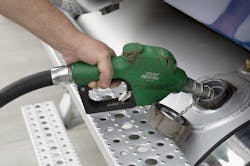Trucking association warns of nearly $7 diesel
California clean fuel directives will drive up diesel prices at the pump to around $6.69/gal. and put California’s truckers at a significant competitive disadvantage to trucks based in other states, according to a study just released by the California Trucking Assn. (CTA).
The study, “The Impact of the Low Carbon Fuel Standard & Cap-and-Trade Programs on California Retail Diesel Prices,” prepared by Bethesda, Md.-based consultants Stonebridge Associates Inc., examined the effect of California’s new low-carbon fuel and cap-and-trade emissions initiatives on the state's retail diesel future.
By 2020, the two programs combined could increase the price of diesel fuel by $2.22/gal., the report said. That would represent more than a 50% increase in the price of diesel and a shocking $6.69/gal. at the pump. The average price difference between California and neighboring states would be $2.33gal., when accounting for taxes.
“These higher California-only diesel costs will create a substantial cost bubble around California where inside the bubble diesel prices will be significantly higher than in the rest of the country,” the study noted.
The study points out that a California-only diesel price will put California’s transportation sector at a significant competitive disadvantage. “These cost disadvantages will allow out-of-state companies to effortlessly strip away the California industry’s commercial transportation business along the state’s central I-5 and US 99 trade corridors,” the study said.
Out-of-state trucking companies will avoid the impact of more expensive California diesel by fueling as much as possible in bordering states like Nevada and Arizona, the study said, pointing out that trucks based outside the state already use computer-based devices that help avoid California diesel costs by telling drivers when and how much to fuel in California.
“This cost-avoidance capability in combination with two 200-gal. fuel tanks gives newer out-of-state trucks a 3,200-mi. range and would place California-based logistics companies at a marked disadvantage,” the study said. It would also allow out-of-state companies to readily strip away key commercial transportation business along the state’s central I-5 and U.S. 99 trade corridors.
“CTA is supportive of the production and use of alternative fuels, but the cost gap between CARB’s Low Carbon Fuel Standard and the diesel fuel that the other 49 states will continue to use is unacceptable,” said Scott Blevins, president of Mountain Valley Express and 2012 CTA president. “This is a serious setback for any business dependent on diesel fuel for its operations.
“State regulators need to step down from their ivory tower and understand the impact of these unfair policies on California truckers,” Blevins added. CARB’s “blind pursuit” of such policies will drive many California-based trucking companies out of state or out of business.
The report said such diesel price increases will cast an even wider net affecting food, fuel, clothing and other essential services transported by trucks.
The study also pointed out ARB’s lack of response, to date, to concerns voiced by its Advisory Panel during its recently completed LCFS program review.
“The likely availability, or capacity to use, the necessary alternative fuels within the program’s remaining 9-year time frame is quite low,” the study said, “yet that key fact is not reflected in ARB’s public analyses of the program.”
“ARB’s staff analyses propose compliance scenarios that are highly unrealistic, put forth price forecasts that deliberately underestimate likely program costs by underestimating alternative fuels costs, constructively misinterpret the requirements and over-estimate the costs of the federal RFS2 alternative fuels program, and summarily dismiss concerns about the LCFS program’s infeasibility as merely a matter of opinion,” the study concluded.
